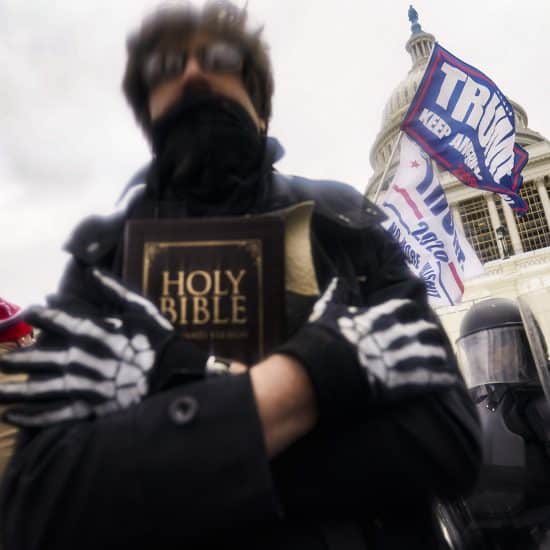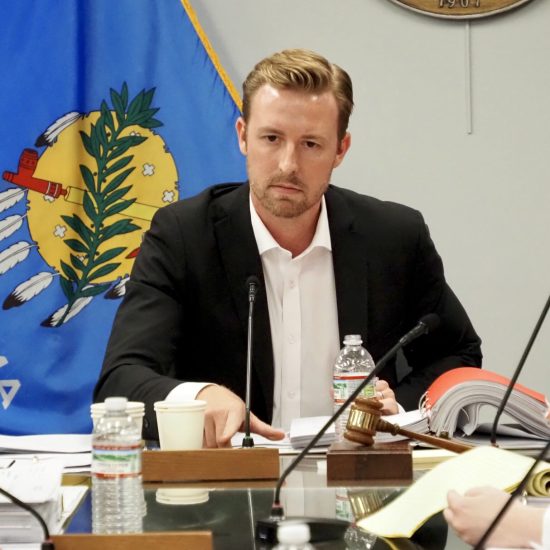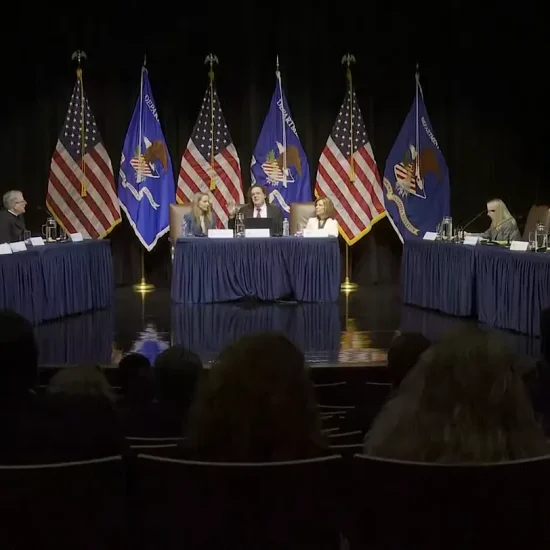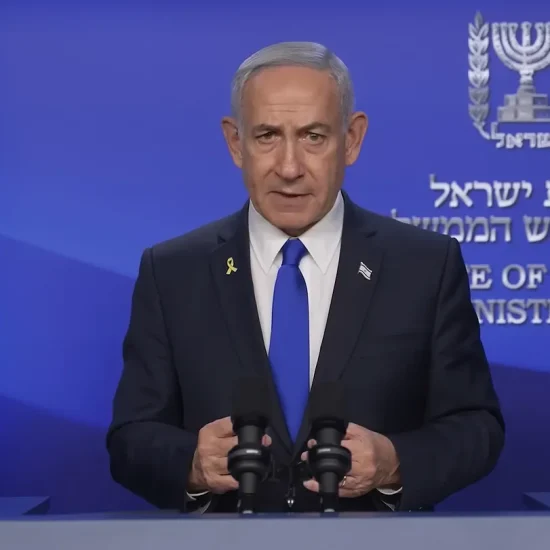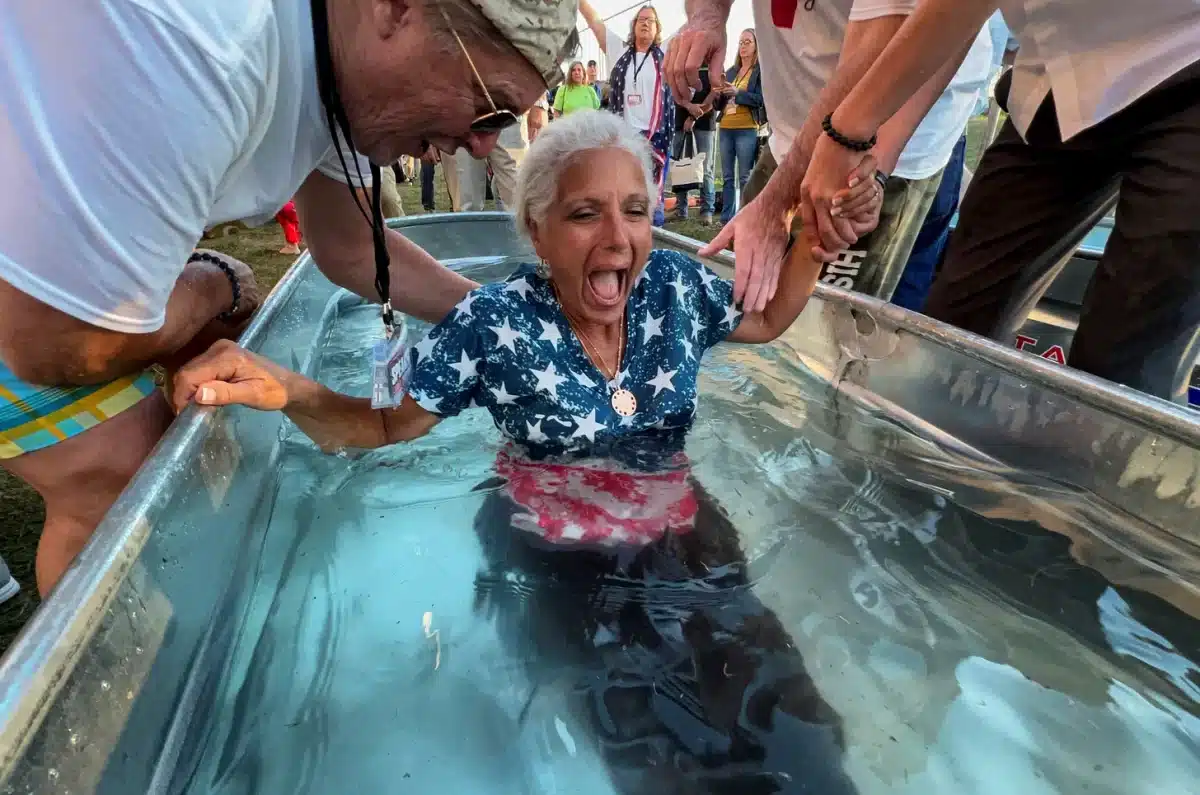
(RNS) — The ReAwaken America tour, a traveling roadshow featuring self-declared Christian Nationalists, rolled into Miami over the weekend, bringing some 50 speakers uniformly declaring the inevitability or necessity of a second term for former President Donald Trump. Others made more arcane promises, such as conservative podcaster Stacy Whited’s forecast of an imminent “transference of wealth from the wicked to the righteous” that would make those in the audience rich.
ReAwaken America events have been a hub for election deniers, conspiracy theorists, and those who discuss immigration as a plot to “replace us” — “us” being by implication white evangelical Christians.
On this score, Miami may appear to be an odd choice for the tour’s organizers: More than half of the city’s residents were born outside the U.S. and more than 70% are Latino. Yet there is evidence that white supremacy and Christian Nationalism have made their way into the Latino community in the United States, including among the most violent fringe of those movements.
The shooter who killed eight people at a mall in Allen, Texas, was identified as Mauricio Garcia, a Latino man whose online activity showed an interest in white supremacy.
Journalists found that Garcia posted photos of Nazi tattoos on his arm and torso, including a large Nazi hooked cross and the SS lightning bolt logo of Adolf Hitler’s paramilitary forces. He also made references encouraging violence against women, celebrating rape, and using vocabulary of the male supremacist incel, according to the Southern Poverty Law Center.
Another prominent Latino linked to far-right groups is Enrique Tarrio, who is Afro-Cuban, and the former leader of the paramilitary group the Proud Boys who was found guilty this month of seditious conspiracy for his role in the Jan. 6, 2021, insurrection at the U.S. Capitol.
But these examples should not come as a surprises, according to Brian Levin, director of the Center for the Study of Hate and Extremism at California State University, San Bernardino, who said that the spread of xenophobic prejudice and bigotry online has helped make intolerance “transnational and transethnic.”
“Misogyny, a fascination with fascism, weapon fetishization are things that, I think, define aggressive masculinity. That cuts across a variety of ethnicities and subcultures,” Levin said.
Levin also said that Latino Americans can be drawn to mainstream conservative ideas about the value of hard work and so-called family values and can come into contact with groups online that may lead them down a rabbit hole “where the direction and the depth and the acceptability of aggression become more fixed.”
The increasing numbers of Latinos joining Pentecostal or other evangelical churches mean that they increasingly hear messages from prosperity-gospel preachers, including those who believe Trump was ordained by God to be president.
In 2020 the Trump reelection campaign launched “Evangelicals for Trump” with a visit to El Rey Jesus Global, a Latino megachurch in Miami led by pastor Guillermo Maldonado. El Rey is part of the Word of Faith network, a subset of the Pentecostal movement that espouses a form of the prosperity gospel.
In his 2020 book, “Prosperity Gospel Latinos and Their American Dream,” sociologist and Presbyterian minister Tony Tian-Ren Lin said the prosperity gospel “shows immigrants how they may thrive in a late-capitalist society.”
“The pursuit of Prosperity Gospel holiness is equivalent to the pursuit of the American dream,” he writes.
The Rev. Elizabeth Rios, who has served as a pastor of a Pentecostal church in Florida, said she has seen Latinos embrace Christian Nationalist ideas. “They do think that the U.S. has a special relationship with God, and that it’s supposed to be a Christian country,” she said.
“These immigrant groups have gone from being newcomers to kind of established. They have now had some access to privileges that are associated with whiteness,” she said.
Rios, who started an online and “justice-oriented” faith-based community in Florida, said it’s crucial for local churches to address Christian Nationalism. The church, she said, is where Latinos get their spiritual sustenance and their identity. “It’s the church that can disciple people out of Christian Nationalism.”
The Rev. Carlos L. Malavé, president of the Latino Christian National Network, said that white Christian Nationalism has “infiltrated” many Latino Christians “in such a powerful way that they are not even aware of the position they are supporting.”
Some are aware, he said, and unabashed in “supporting some of the tenets of this ideology.”
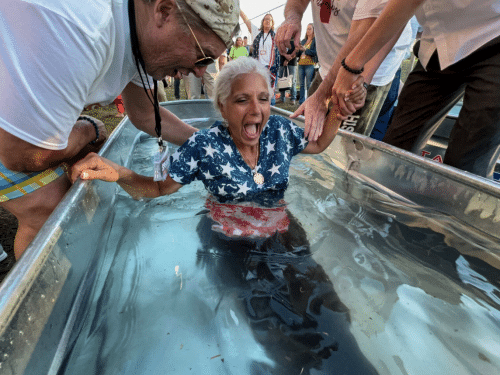
A woman is baptized during the ReAwaken America Tour at Cornerstone Church in Batavia, N.Y., Friday, Aug. 12, 2022. In the version of America laid out at the ReAwaken tour, Christianity is at the center of American life and institutions, it’s under attack and attendees need to fight to restore and protect the nation’s Christian roots. It’s a message repeated over and over at ReAwaken — one that upends the constitutional ideal of a pluralist democracy. (AP Photo/Carolyn Kaster)
Malavé’s organization is planning a summit in September to discuss how far-right ideas are popping up in Latino Christian spaces, particularly in evangelical and Pentecostal houses of worship. The gathering will be at Candler School of Theology in Atlanta and will be limited to about 60 key Latino Christian leaders from across the country.
A new survey of 6,212 Americans by the Public Religion Research Institute and the Brookings Institution found that Americans who are supportive of Christian Nationalism generally hold less favorable views of immigrants, racial and ethnic minorities, and are more likely to hold negative views of Muslims and Jews.
About 65% of white Christian Nationalism sympathizers and adherents disagree that white supremacy is still a major problem in the U.S., nearly twice as high as Americans overall in the survey. Additionally, 66% of white Christian nationalism sympathizers and 81% of adherents believe in replacement theory, the view that immigrants are invading the U.S. to replace the country’s current culture.
Meanwhile, the report revealed that fewer than a third of Americans, or 29%, qualify as Christian Nationalists, and of those, two-thirds define themselves as white evangelicals.
Support for Christian Nationalism is significantly smaller among Asian American, mixed race, Black and Hispanic Protestants, but that shifts among those who identify as evangelical. White (29%), Hispanic (25%) and Black (20%) Christians who describe themselves as evangelical are each about five times as likely to be adherents of Christian Nationalism as those of the same racial or ethnic groups who are Christian but not evangelical.
The Latino Christian National Network is made up of leaders of Latino ministries and denominations, including mainline Christians, evangelicals, and Pentecostals, according to Malavé. It was formed, he said, with an awareness that progressive and conservative faith communities alike “could easily be manipulated and divided.”
Malavé said the September summit will “look at the anti-immigrant nature of Christian Nationalism” and explore colonialism in Latin America and its relationship with Christian Nationalism.
Others see it differently.
Tony Suarez, the chief operating officer of the evangelical National Hispanic Christian Leadership Conference, said there are “extreme ideologies that are masquerading under the guise of Christian Nationalism that are dangerous.”
But what’s not dangerous, Suarez said, is “the concept of being extremely devoted to one’s faith and one’s country.”
Suarez said Christian Nationalism is a derogatory label directed toward evangelicals like him who stand against transgender rights, who believe marriage is between a man and a woman, and who are “pro-life, from the womb to the tomb.”
“I would hope that they have some evangelicals and some people that are pro-biblical marriage, pro-life, that are at the table engaging in the conversation,” he said of the summit. “Otherwise, it’s not a true reflection of the entire Christian Latino community.”

